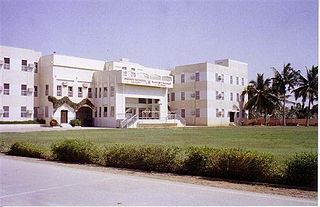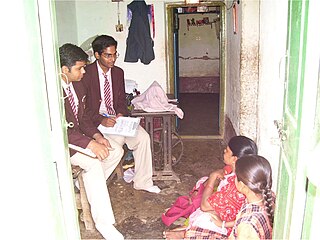
Sambalpur University is a public research university located in Burla town, of district Sambalpur, India, in the state of Odisha. Popularly known as Jyoti Vihar, it offers courses at the undergraduate, post-graduate and doctoral (Ph.D.) levels. The governor of Odisha is the chancellor of the university. The campus is located 15 km away from Sambalpur.

Bhavan's Vidya Mandir, Girinagar is a Senior Secondary School affiliated to the Central Board of Secondary Education (CBSE), New Delhi. It is a part of the Bharatiya Vidya Bhavan, a group of educational institutions and is situated in Girinagar, Ernakulam (Cochin), Kerala, India.
Previously a neglected aspect of the Indian Central government, Education in Odisha is witnessing a rapid transformation. Its capital city, Bhubaneswar along with Cuttack, are emerging as a knowledge hub in India with several new public and private universities, including the establishment of an Indian Institute of Technology after five decades of demand.

St. Thomas' College, Dehradun is a co-educational Indian Certificate of Secondary Education school in Dehradun, the capital of the state of Uttarakhand in India, founded in 1916. It is located in the heart of the city of Dehra Dun on Cross Road. The school is regarded as among the best schools in India based on its consistent results in both the 10th and 12th examinations and the magnitude of extra-curricular activities and sports in its culture.
Indian School Al Wadi Al Kabir (ISWK), established in 1979 , is located in the city of Muscat, Oman. The school was founded in 1941 as a Gujarati Medium School for the children of the business community members. Mr. Leo Lobo was the school's principal from 1990 to spring 2008. Mr. P.N. Ashok succeeded him as the principal until his resignation in 2012. The current principal of ISWK is Mr. DN Rao.

Rashtriya Military School, Dholpur is one of five military schools of India. It is situated in Dholpur in Rajasthan and was established in 1962 by a former defence minister, Krishnan Menon, to facilitate education of the children of the Defense personnel as well as the civilians. Military Schools in India were previously known as King George Royal Indian Military College.

The Indian School Salalah is an Indian-run, self-financing, co-educational institution, primarily established to meet the academic needs of children of Indian expatriates working in the Sultanate of Oman in the Persian Gulf. The school also admits children of other nationalities. The school is located in the Dahariz area, of Salalah town, in the southern governorate of Dhofar.
Air Force School (Coimbatore) was set up to provide education to the children of the Indian Air Force (IAF) personnel.

Sainik School Tilaiya, Jharkhand, India, is a public boarding school established and managed by the Sainik Schools Society under Ministry of Defence. It is a preparatory school for entry into the defence services — National Defence Academy (NDA), Khadakwasla, Pune and Indian Naval Academy (INA), Ezhimala, Kerala.

St. Michael's High School, Patna, also referred to as SMHS Patna or SMHS for short, is a private, Roman Catholic, co-educational high school in the Digha neighborhood of Patna, Bihar, India.

The Board of Secondary Education, Odisha is a board of education for public and private schools under the state government of Odisha, India.

The Secondary Board High School, Cuttack is an Indian Government high school in Cuttack, Odisha. It is situated at the Bajrakabati Road of Cuttack on the same campus as the Board of Secondary Education, Odisha (BSE). Established in 1959 by the BSE, the school was created as a model high school for imparting education in the Odisha state board system. The school has classes only from Std VI to X.

Central Modern School is an English-medium co-educational day boarding (private) school located in Baranagar, West Bengal, India. The school educates pupils from the Pre-Preparatory class to the 12th grade. The school is affiliated with the Council for the Indian School Certificate Examinations (CISCE), New Delhi.

Socially Useful Productive Work (SUPW) is a "purposive productive work and services related to the needs of the child and the community, which will be proved meaningful to the learner. Such work must not be performed mechanically but must include planning, analysis and detailed preparation, at every stage so that it is educational. Adoption of improved tools and materials, where available and the adoption of modern techniques will lead to an appreciation of the needs of a progressive society based on technology." Students learn to work as a team, with skill and deftness. It was introduced in 1978, by the Ministry of Education in India to promote Gandhian values and educational ideas of Mahatma Gandhi.

The Aryan School is a co-educational independent boarding school in Dehradun, Uttarakhand, India. Founded in 2001 by Sunny Gupta director of Wheezal Labs, "the biggest homoeopathic combinations unit in northern India". The school offers modern education based on the Vedic principle.
Greenvalley Public School is an educational institution in Nellikuzhi, Kothamangalam, in the state of Kerala, India. It is affiliated to Central Board of Secondary Education, New Delhi, for AISSE and AISSCE examinations. It was established in 1996 by Molly Pradeep, late wife of the present director, Pradeep Kuriakose. It has a sister school in Perumbavoor, which provides elementary education.

Bishop Morrow School (BMS) is an English medium school in Krishnanagar, Nadia, India. It is situated at Bejikhali crossing. It is a private-profit school run by SMI in the district of Nadia. Currently, the school is affiliated with the Council for the Indian School Certificate Examinations, up to Class X and Class XII(Science and Arts Stream). The school follows the Indian Certificate of Secondary Education Examination (ICSE) & Indian School Certificate Examination (ISC) syllabus.

Loyola School, Bhubaneswar, is a private Catholic primary and secondary school located in Bhubaneswar, in the state of Odisha, India. The co-educational, English-medium school was founded by the Jesuits in 2001.

St. Joseph's Convent School is an Indian girls' convent pre-primary to higher-secondary English-medium school, located in Hamirpur, Rourkela, Sundergarh district, Odisha. The school is affiliated under the Indian Certificate of Secondary Education (ICSE) and the Indian School Certificate (ISC).

The Indo English School, Rourkela is an Indian school, located in Rourkela, Odisha.

















